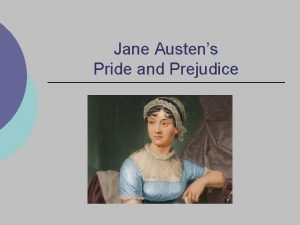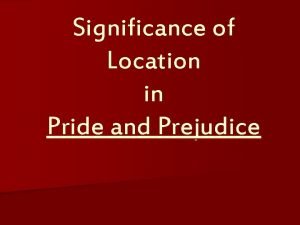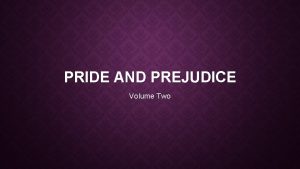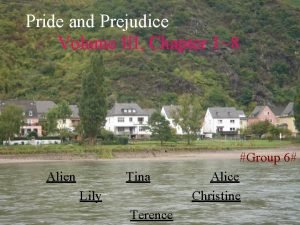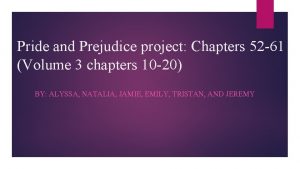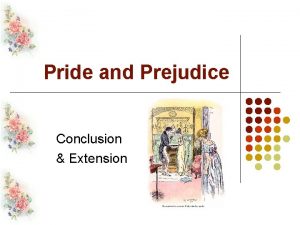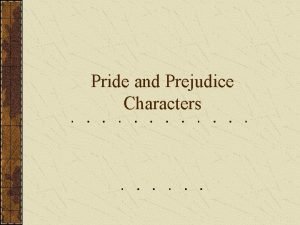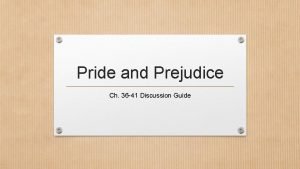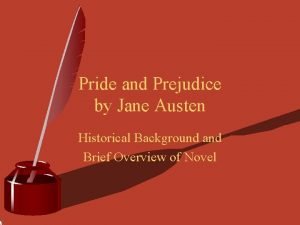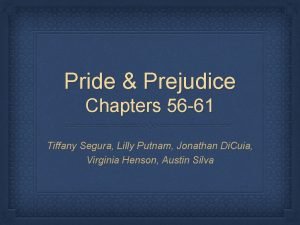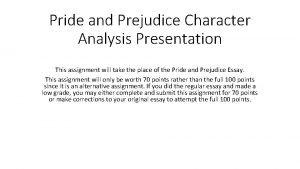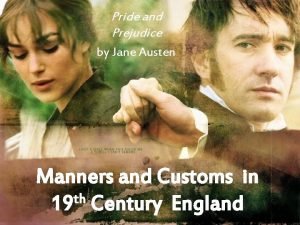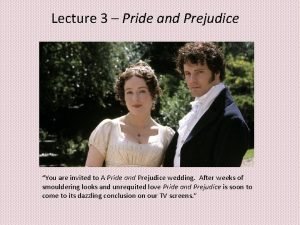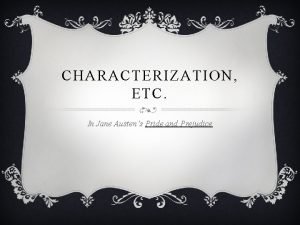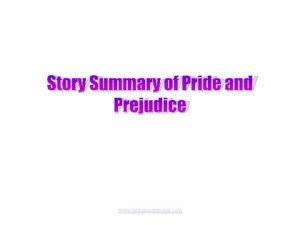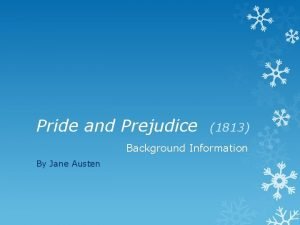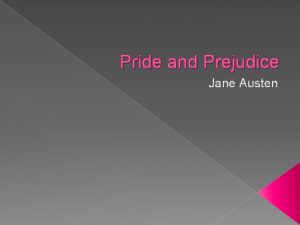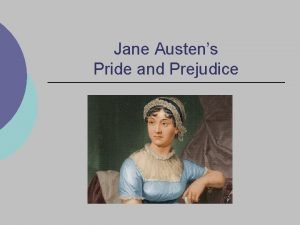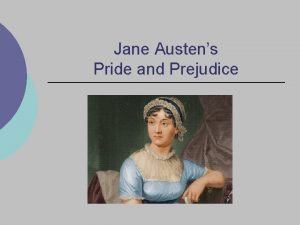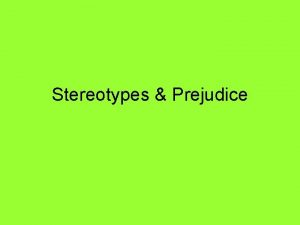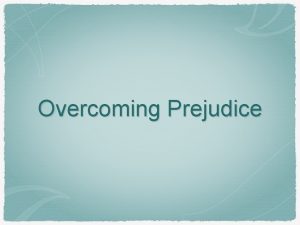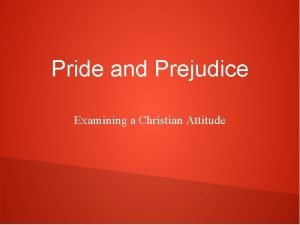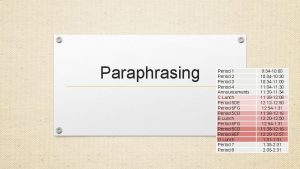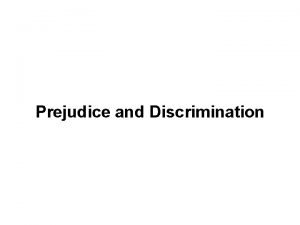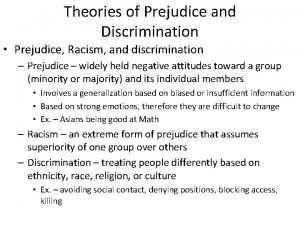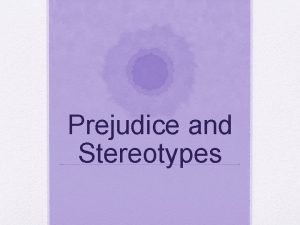PRIDE AND PREJUDICE England in the Regency Period


















- Slides: 18

PRIDE AND PREJUDICE England in the Regency Period Richardson, Eve. Pride and Prejudice Teaching Unit. Clayton, DE: Prestwick House, 2005. Print.

The Regency Period • • • Jane Austen’s novels were published during England’s Regency period, which lasted from 1810 until 1820. In 1810, when England’s monarch King George III was deemed incompetent to rule the country because of an ongoing struggle with mental illness. His son, George Augustus Frederick, who later became George IV, was established by Parliament as Prince Regent and took over the leadership of the kingdom on behalf of his father

The Landed Gentry – The Middle Class Rises • Profits from the Industrial Revolution and an expanding colonial system benefited middle-class businessmen and investors. • Middle-class merchants and professionals had experienced a sharp increase in wealth and, by the beginning of the nineteenth century, had established themselves as members of the upper class. • Eager to improve their social status and reputations, these newly rich members of the upper class strived to align themselves with England’s landed aristocracy. • Although these new-money upper class families, known as the landed gentry, did not hold hereditary titles, they commonly considered themselves to be on the same social level as the traditional landed aristocracy due to their wealth and possessions.

The Two Percent! • Austen’s novels take place almost exclusively within the privileged circle of England’s landed gentry and aristocracy. • Historically, it is important to bear in mind that less than two percent of England’s population enjoyed the social status and lifestyle of the upper classes. Most of England’s population was composed of modest middle-class families, workers, housekeepers, servants, soldiers, etc. • Machines were replacing manual labor and laying off workers. • Unemployment was rampant among England’s working classes, leading to starvation and poverty for many families and causing workers’ riots and social unrest. • Politically, few citizens had the right to participate in government, and rich landowners dominated Parliamentary elections and political decisions.

The Emperor of France • In the late 1790 s, Napoleon had established a totalitarian regime in France, and in 1804, he crowned himself “Emperor of France. ” • One year earlier, in 1803, a war between England France broke out that lasted until 1814 and put a severe strain on England’s economy. • Austen’s references to the war and the military are vague: she allows the military to play a significant role in Pride and Prejudice, but she shies away from offering any political commentary related directly to the war.

THE INDUSTRIAL REVOLUTION AND CHANGES IN ENGLAND’S SOCIAL CLASS STRUCTURE

Three Classes … • By the nineteenth century, a social class system consisting of three distinctive groups had established itself in England: • The working class consisted of agricultural workers, factory workers, mine workers, maids, servants, housekeepers, soldiers, etc. • The middle class consisted of merchants and professionals as well as business owners • The upper class consisted of the old hereditary aristocracy and the new landed gentry, who had come into money through commercial enterprise and ascended from the middle class. Members of the upper class did not work and frequently employed farmers to work their land. During Austen’s time, the upper class controlled England’s politics

Mr. Darcy In Pride and Prejudice, Mr. Darcy is a representative of the hereditary aristocracy. He is a wealthy landowner who does not have to work for a living. He employs workers to farm his land, and families living in the area surrounding his estate depend on his patronage.

Mr. Bingley The Bingleys represent the new landed gentry. Mr. Bingley’s father was able to acquire a considerable amount of wealth through trade. He gave up his business and moved his family into the country. Mr. Bingley and his sisters are now considered to be members of the upper class.

The Bennets own land, but they are a middleclass family. Unlike Mr. Darcy, Mr. Bennet must – in essence – work the land himself.

WOMEN, PATRIARCHY, AND PROPERTY RIGHTS

Few Legal Rights … • For most of their lives, women depended on the men in their lives —first their fathers and brothers, then their husbands—for protection and survival. • Women could not own property. They were considered to be the property of men, hence depending on their fathers to “give them away” into a lucrative marriage union. • After a father’s death, his land possessions often passed to a male heir (either a son or another male relative), leaving his wife and daughters entirely at the mercy of other male family members.

Mrs. Bennet is on a Mission! • Female preoccupation with marriage, such as Mrs. Bennet’s obsession with finding husbands for all her daughters, was, therefore, not only a social preoccupation but a necessity for women who wanted to maintain a comfortable lifestyle for themselves and their daughters.

Entailment • Strict inheritance regulations, known as the “entailment” of an estate, determined how property would be passed through several generations within a family. • In Pride and Prejudice, Mr. Bennet’s land possessions are entailed to his closest male relative. • A distant relative, Mr. Bennet’s cousin, Mr. Collins, will inherit the family estate after the father’s death. • Once Mr. Collins inherits the house and land, Mrs. Bennet and her five daughters will be forced to find another home.

Lady Catherine • Not all estates, however, were entailed exclusively through the male line of inheritance. • Very few exceptions determined that women could inherit the estate from their father or retain their husbands’ possessions. • In Pride and Prejudice, the rich and influential Lady Catherine De Bourgh, the patroness of Rosings Park, stands as a rare example of an independent woman in the early nineteenth century

Thematic Ideas PRIDE AND PREJUDICE

Thematic Ideas Social Class and the Lack of Class Mobility • Pride and Prejudice presents the conflict that arises when members of the middle class, such as the Bennets, mingle socially with members of the upper classes, represented by Mr. Darcy and Mr. Bingley. • Mr. Darcy’s hesitation when it comes to admitting his admiration and affection for Elizabeth Bennet exemplifies his initial conviction that he could and should never marry a woman from a lower social class. Marriage and Family • Pride and Prejudice expresses Austen’s disillusionment with the fact that women were, all too often, forced into marital unions purely out of financial necessity. • Through heroine Elizabeth Bennet, Austen advocates a new ideal of marriage and partnership based on mutual respect and love. • At the same time, all of the families Austen presents are deeply woven into the fabric of their social surroundings. In fact, Netherfield Park, Longbourn, and Meryton form a close-knit community in which individuals’ problems and experiences become common social property.

Thematic Ideas Propriety, Social Decorum, and Reputation Pride and Prejudice • Since the family’s place within society was considered to be of critical importance during the eighteenth and nineteenth centuries, an adherence to the laws of propriety, social decorum, and reputation determined the ways in which human beings were judged by others. • In Pride and Prejudice, individual accomplishments and an independent character are of little concern when it comes to evaluating a human being’s value. Instead, the ways in which men and women are able to live according to the moral standards set forth by their community determines the extent to which their friends and neighbors will respect them. • When Jane Austen began drafting Pride and Prejudice, she originally planned to entitle her novel First Impressions. • Indeed, first impressions and premature perceptions complicate the relationships between characters throughout Austen’s novel. All too often, pride and prejudice influence characters’ perceptions of one another.
 Regency england social classes
Regency england social classes Ironic dialogue
Ironic dialogue Location of pride and prejudice
Location of pride and prejudice Pride and prejudice volume 2
Pride and prejudice volume 2 Chapter 18 pride and prejudice
Chapter 18 pride and prejudice Pride and prejudice volume 3 chapter 11
Pride and prejudice volume 3 chapter 11 Pride and prejudice conclusion
Pride and prejudice conclusion Pride and prejudice characters
Pride and prejudice characters Pride and prejudice chapter 41 summary
Pride and prejudice chapter 41 summary Jane austen historical context
Jane austen historical context Pride and prejudice chapter 49 summary
Pride and prejudice chapter 49 summary Pride and prejudice chapter 56
Pride and prejudice chapter 56 Pride and prejudice character analysis essay
Pride and prejudice character analysis essay Pride and prejudice etiquette
Pride and prejudice etiquette Catherine belsey books
Catherine belsey books Dynamic characters in pride and prejudice
Dynamic characters in pride and prejudice Mr bingley
Mr bingley Pride and prejudice background
Pride and prejudice background Irony dialogue
Irony dialogue
